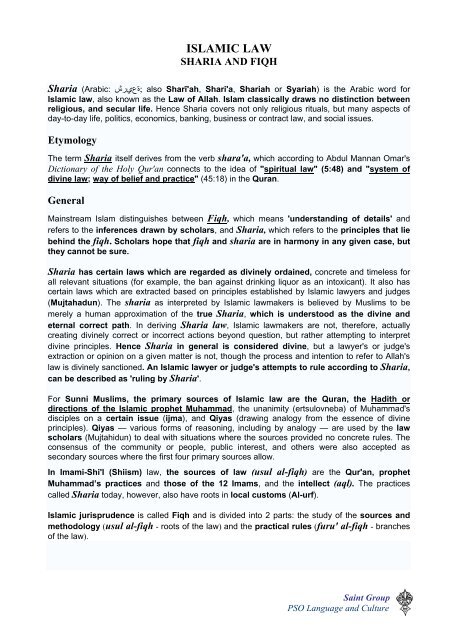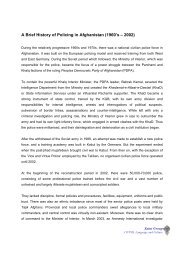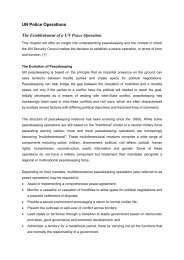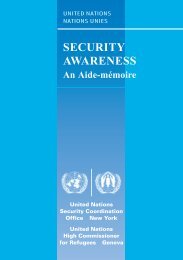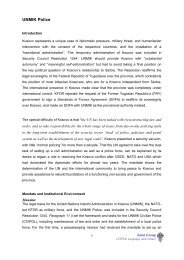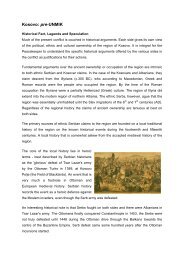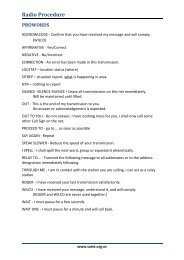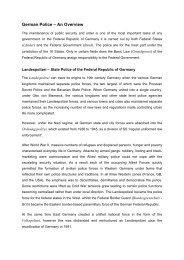Islamic law sharia and fiqh - saint
Islamic law sharia and fiqh - saint
Islamic law sharia and fiqh - saint
You also want an ePaper? Increase the reach of your titles
YUMPU automatically turns print PDFs into web optimized ePapers that Google loves.
ISLAMIC LAW<br />
SHARIA AND FIQH<br />
Sharia (Arabic: شريعة; also Sharī'ah, Shari'a, Shariah or Syariah) is the Arabic word for<br />
<strong>Islamic</strong> <strong>law</strong>, also known as the Law of Allah. Islam classically draws no distinction between<br />
religious, <strong>and</strong> secular life. Hence Sharia covers not only religious rituals, but many aspects of<br />
day-to-day life, politics, economics, banking, business or contract <strong>law</strong>, <strong>and</strong> social issues.<br />
Etymology<br />
The term Sharia itself derives from the verb shara'a, which according to Abdul Mannan Omar's<br />
Dictionary of the Holy Qur'an connects to the idea of "spiritual <strong>law</strong>" (5:48) <strong>and</strong> "system of<br />
divine <strong>law</strong>; way of belief <strong>and</strong> practice" (45:18) in the Quran.<br />
General<br />
Mainstream Islam distinguishes between Fiqh, which means 'underst<strong>and</strong>ing of details' <strong>and</strong><br />
refers to the inferences drawn by scholars, <strong>and</strong> Sharia, which refers to the principles that lie<br />
behind the <strong>fiqh</strong>. Scholars hope that <strong>fiqh</strong> <strong>and</strong> <strong>sharia</strong> are in harmony in any given case, but<br />
they cannot be sure.<br />
Sharia has certain <strong>law</strong>s which are regarded as divinely ordained, concrete <strong>and</strong> timeless for<br />
all relevant situations (for example, the ban against drinking liquor as an intoxicant). It also has<br />
certain <strong>law</strong>s which are extracted based on principles established by <strong>Islamic</strong> <strong>law</strong>yers <strong>and</strong> judges<br />
(Mujtahadun). The <strong>sharia</strong> as interpreted by <strong>Islamic</strong> <strong>law</strong>makers is believed by Muslims to be<br />
merely a human approximation of the true Sharia, which is understood as the divine <strong>and</strong><br />
eternal correct path. In deriving Sharia <strong>law</strong>, <strong>Islamic</strong> <strong>law</strong>makers are not, therefore, actually<br />
creating divinely correct or incorrect actions beyond question, but rather attempting to interpret<br />
divine principles. Hence Sharia in general is considered divine, but a <strong>law</strong>yer's or judge's<br />
extraction or opinion on a given matter is not, though the process <strong>and</strong> intention to refer to Allah's<br />
<strong>law</strong> is divinely sanctioned. An <strong>Islamic</strong> <strong>law</strong>yer or judge's attempts to rule according to Sharia,<br />
can be described as 'ruling by Sharia'.<br />
For Sunni Muslims, the primary sources of <strong>Islamic</strong> <strong>law</strong> are the Quran, the Hadith or<br />
directions of the <strong>Islamic</strong> prophet Muhammad, the unanimity (ertsulovneba) of Muhammad's<br />
disciples on a certain issue (ijma), <strong>and</strong> Qiyas (drawing analogy from the essence of divine<br />
principles). Qiyas — various forms of reasoning, including by analogy — are used by the <strong>law</strong><br />
scholars (Mujtahidun) to deal with situations where the sources provided no concrete rules. The<br />
consensus of the community or people, public interest, <strong>and</strong> others were also accepted as<br />
secondary sources where the first four primary sources allow.<br />
In Imami-Shi'I (Shiism) <strong>law</strong>, the sources of <strong>law</strong> (usul al-<strong>fiqh</strong>) are the Qur'an, prophet<br />
Muhammad’s practices <strong>and</strong> those of the 12 Imams, <strong>and</strong> the intellect (aql). The practices<br />
called Sharia today, however, also have roots in local customs (Al-urf).<br />
<strong>Islamic</strong> jurisprudence is called Fiqh <strong>and</strong> is divided into 2 parts: the study of the sources <strong>and</strong><br />
methodology (usul al-<strong>fiqh</strong> - roots of the <strong>law</strong>) <strong>and</strong> the practical rules (furu' al-<strong>fiqh</strong> - branches<br />
of the <strong>law</strong>).<br />
Saint Group<br />
PSO Language <strong>and</strong> Culture
History <strong>and</strong> Background<br />
The authority of Sharia is drawn from 2 primary sources, as well as two secondary sources.<br />
The first major source is the specific guidance in the Quran, <strong>and</strong> the second source is the<br />
Sunnah, literally the 'Way', i.e. the way that Muhammad lived his life. (The compilation<br />
of all that Muhammad said, did or approved of is called the Hadith.)<br />
A lesser source of authority is Qiyas, which is the extension by analogy of existing Sharia <strong>law</strong> to<br />
new situations. Finally, Sharia <strong>law</strong> can be based on ijma, or consensus (konsensusi,<br />
tanxmoba). Justification for this final approach is drawn from the Hadith where Muhammad<br />
states; "My nation cannot agree on an error." The role of ulema, i.e. scholars, is critical, since<br />
they are the ones who study the <strong>Islamic</strong> <strong>law</strong> <strong>and</strong> therefore have authority to represent it. Sharia<br />
has largely been codified by the schools (madhhabs) of <strong>Islamic</strong> Jurisprudence (Fiqh).<br />
The comprehensive nature of Sharia <strong>law</strong> is due to the belief that the <strong>law</strong> must provide all that is<br />
necessary for a person's spiritual <strong>and</strong> physical well-being. All possible actions of a Muslim are<br />
divided (in principle) into 5 categories: obligatory (valdebuleba), meritorious (damsaxureba),<br />
permissible (nebis darTva), reprehensible (dagmoba), <strong>and</strong> forbidden.<br />
Fundamental to the obligations of every Muslim are the Five Pillars of Islam:<br />
The Testimony of Faith (Shahadah) - the declaration that there is none worthy of worship<br />
except Allah (Arabic: God) <strong>and</strong> that Muhammad is His messenger.<br />
Ritual Prayer (Salat) - establishing of the five daily Prayers.<br />
Obligatory (religious) almsgiving (Zakat) - which is generally 2.5% of the total savings for a<br />
rich man working in trade or industry, <strong>and</strong> 10% or 20% of the annual produce for agriculturists.<br />
This money or produce is distributed among the poor.<br />
Fasting (marxva)<br />
The Pilgrimage to Mecca (Hajj) - this is done during the month of Zul Hijjah, <strong>and</strong> is<br />
compulsory once in a lifetime for one who has the ability to do it. If the Muslim is in ill health or<br />
in debt, he or she is not required to perform Hajj. They do this to show moral importance to<br />
Allah, <strong>and</strong> to join the Ummah (family of Islam)<br />
Sections of Sharia <strong>law</strong><br />
Sharia <strong>law</strong> is divided into two main sections:<br />
I The acts of worship, or al-ibadat, these include:<br />
1. Ritual Purification<br />
2. Prayers<br />
3. Fasts (marxva)<br />
4. Charities<br />
5. Pilgrimage to Mecca<br />
II Human interaction, or al-mu'amalat, which includes:<br />
6. Financial transactions<br />
7. Endowments (shecirva)<br />
8. Laws of inheritance (memkvidreoba)<br />
9. Marriage, divorce, <strong>and</strong> child care<br />
10. Foods <strong>and</strong> drinks (including ritual slaughtering <strong>and</strong> hunting)<br />
11. Penal punishments<br />
12. Warfare <strong>and</strong> peace<br />
13. Judicial matters (including witnesses <strong>and</strong> forms of evidence)<br />
Saint Group<br />
PSO Language <strong>and</strong> Culture
Contemporary Practice of Sharia Law<br />
There is tremendous variance in the interpretation <strong>and</strong> implementation of <strong>Islamic</strong> <strong>law</strong> in<br />
Muslim societies today. Some believe that colonialism, which often replaced religious <strong>law</strong>s with<br />
secular ones, has caused this variance. More recently, liberal movements within Islam have<br />
questioned the relevance <strong>and</strong> applicability of <strong>sharia</strong> from a variety of perspectives. As a result,<br />
several of the countries with the largest Muslim populations, including Indonesia, Bangladesh<br />
<strong>and</strong> Pakistan, have largely secular constitutions <strong>and</strong> <strong>law</strong>s, with only a few <strong>Islamic</strong> provisions<br />
in family <strong>law</strong>. Turkey has a constitution that is strongly secular.<br />
Likewise, most countries of the Middle East <strong>and</strong> North Africa maintain a dual system of secular<br />
courts <strong>and</strong> religious courts (shura), in which the religious courts mainly regulate marriage <strong>and</strong><br />
inheritance. Saudi Arabia <strong>and</strong> Iran maintain religious courts for all aspects of<br />
jurisprudence, <strong>and</strong> religious police assert social compliance. Sharia is also used in Sudan,<br />
Libya <strong>and</strong> for a time in modern Afghanistan. Some states in northern Nigeria have reintroduced<br />
Sharia courts (shura). In practice the new Sharia courts in Nigeria have most often meant the<br />
re-introduction of relatively harsh punishments without respecting the much tougher rules of<br />
evidence <strong>and</strong> testimony. The punishments include amputation of one/both h<strong>and</strong>s (s) for theft<br />
<strong>and</strong> stoning for adultery. But overall the implementation of the Sharia <strong>law</strong> is meant to create a<br />
just society where the <strong>law</strong> <strong>and</strong> people live in harmony. Many Western views consider the<br />
punishments described above as harsh, but <strong>Islamic</strong> scholars argue, that if implemented properly,<br />
these punishments will serve as a deterrent to crime. Alternatively it has been argued that the<br />
Prophet Muhammad would not run courts in such a manner nor introduce overly harsh<br />
punishments into societies rich enough to afford prisons.<br />
Like Jewish <strong>law</strong> <strong>and</strong> Christian canon <strong>law</strong>, <strong>Islamic</strong> <strong>law</strong> is interpreted differently by different<br />
people in different times <strong>and</strong> places. In the h<strong>and</strong>s of moderates, religious <strong>law</strong> can be moderate<br />
<strong>and</strong> even liberal. In the h<strong>and</strong>s of post-Enlightenment readers of philosophy, religious <strong>law</strong> becomes<br />
associated mainly with ritual, theology, or history <strong>and</strong> no longer regulates society or the state.<br />
In the h<strong>and</strong>s of fundamentalists, however, it is legally binding on all people of the faith <strong>and</strong><br />
even on all people who come under their control. <strong>Islamic</strong> <strong>law</strong> to American Muslims in Boston,<br />
or Houston is very different than <strong>Islamic</strong> <strong>law</strong> to religious Muslims in Egypt, Saudi Arabia or Gaza<br />
Strip. All follow <strong>Islamic</strong> <strong>law</strong>, yet their view of the <strong>law</strong> varies as much as individual Muslims vary.<br />
The role of women under Sharia<br />
Islam does not prohibit women from working, but emphasizes the importance of<br />
housekeeping <strong>and</strong> caring for the families of both parents. In theory, <strong>Islamic</strong> <strong>law</strong> allows<br />
spouses to divorce at will, by saying "I divorce you" three times in public. In practice divorce is<br />
more involved than state proceedings vary. In 2003, for example, a Malaysian court ruled that,<br />
under Sharia <strong>law</strong>, a man may divorce his wife via text message as long as the message was<br />
clear <strong>and</strong> (mkapio). Such a divorce, known as the "triple talaq" is not allowed in most Muslim<br />
states.<br />
In addition, women are generally not allowed to be clergy or religious scholars. Many<br />
interpretations of <strong>Islamic</strong> <strong>law</strong> hold that women may not have prominent jobs, <strong>and</strong> thus are<br />
forbidden from working in the government. This has been a mainstream view in many Muslim<br />
nations in the last century, despite the example of Muhammad’s wife Aisha, who both took part<br />
in politics <strong>and</strong> was a major authority on hadith.<br />
Saint Group<br />
PSO Language <strong>and</strong> Culture
Several non-Sharia Muslim countries have had female heads of government or state: Benazir<br />
Bhutto in Pakistan, Megawati Sukarnoputri in Indonesia, Tansu Ciller in Turkey, <strong>and</strong> Khaleda Zia<br />
<strong>and</strong> Sheikh Hasina in Bangladesh. Muslim women also hold important positions in governments<br />
or in corporations; the head of Pakistan's Central Bank is a woman (Dr. Shamshad Akhtar), <strong>and</strong><br />
so is the Chairperson of Unilever Pakistan, a Pakistani Army Female General is the first<br />
woman in the world to hold such a post, <strong>and</strong> the list goes on as there are countless examples.<br />
A Muslim may not marry or remain married to an unbeliever of either sex. A Muslim man may<br />
marry a woman of the People of the Book; traditionally, however, <strong>Islamic</strong> <strong>law</strong> forbids a Muslim<br />
woman from marrying a non-Muslim man. If the man chooses to convert to Islam then marriage<br />
would be allowed.<br />
Domestic Justice<br />
According to most interpretations, authorization for the husb<strong>and</strong> to physically beat disobedient<br />
wives is given in the Quran. First, admonishment is verbal, <strong>and</strong> secondly a period of refraining<br />
from intimate relations. Finally, if the husb<strong>and</strong> deems the situation appropriate, he may hit her:<br />
"Men are the protectors <strong>and</strong> maintainers of women, because Allah has given the one more<br />
(strength) than the other, <strong>and</strong> because they support them from their means. Therefore the<br />
righteous women are devoutly obedient, <strong>and</strong> guard in (the husb<strong>and</strong>'s) absence what Allah<br />
would have them guard. As to those women on whose part ye fear disloyalty <strong>and</strong> illconduct,<br />
admonish them (first), (Next), refuse to share their beds, (And last) beat them<br />
(lightly); but if they return to obedience, seek not against them Means (of annoyance): For<br />
Allah is Most High, great (above you all)." (Quran 4:34 English translation: Yusuf Ali)<br />
The medieval jurist ash-Shafii, founder of one of the main schools of <strong>fiqh</strong>, commented on this<br />
verse that "hitting is permitted, but not hitting is preferable." The Arabic verse uses<br />
idribu¯hunna (from the root daraba ضرب), whose commonest meaning in Arabic has been<br />
rendered as "beat", "hit", "scourge", or "strike". Besides this verse, other meanings for daraba<br />
used in the Qur'an) include 'to travel', 'to make a simile', 'to cover', 'to separate', <strong>and</strong> 'to go<br />
abroad', among others. For this reason - particularly in recent years some consider "hit" to be a<br />
misinterpretation, <strong>and</strong> believe it should be translated as "admonish (darigeba, rcheva) them, <strong>and</strong><br />
leave them alone in the sleeping-places <strong>and</strong> separate from them." Certain modern translations of<br />
the Qur'an in the English language accept the commoner translation.<br />
Several Hadith urge strongly against beating one's wife, such as: "How does anyone of you<br />
beat his wife as he beats the stallion camel <strong>and</strong> then embrace (sleep with) her? (Al-Bukhari,<br />
English Translation, vol. 8, Hadith 68, pp. 42-43), "I went to the Apostle of Allah (peace be<br />
upon him) <strong>and</strong> asked him: What do you say (comm<strong>and</strong>) about our wives? He replied: Give<br />
them food what you have for yourself, <strong>and</strong> clothe them by which you clothe yourself, <strong>and</strong><br />
do not beat them, <strong>and</strong> do not revile them. (Sunan Abu-Dawud, Book 11, Marriage (Kitab Al-<br />
Nikah), Number 2139)".<br />
“Honor killings” are, in the Western world, often erroneously identified as part of <strong>Islamic</strong><br />
teaching, though they are in fact a cultural practice which is neither exclusive to, nor universal<br />
within, the <strong>Islamic</strong> world. Such killings take place within the Muslim communities around the<br />
Mediterranean as well as in the Penjab, India, non-Muslim parts of West Africa, <strong>and</strong> in Central<br />
America; while in Indonesia, the world's largest <strong>Islamic</strong> country, the status of the practice is<br />
unknown.<br />
Saint Group<br />
PSO Language <strong>and</strong> Culture
The stated reason for honour killings is the belief that the woman had caused the clan or<br />
family to lose honour by her alleged sexual activity <strong>and</strong> therefore deserved to be killed.<br />
<strong>Islamic</strong> teaching holds that life is given by Allah <strong>and</strong> should not be taken lightly, but it allows<br />
severe punishment, up to <strong>and</strong> including capital punishment, for certain kinds of crime; these<br />
include, in strict interpretations, all extramarital sexual relations (zina) by both men <strong>and</strong> women -<br />
though only married adulterers may be punished with death.<br />
Crimes in Islam<br />
Crimes under <strong>Islamic</strong> Law can be broken down into 3 major categories. Each will be<br />
discussed in greater detail with some common <strong>law</strong> analogies. The three major crime categories<br />
in <strong>Islamic</strong> Law are:<br />
1. Hadd [plural Hudud] Crimes (most serious).<br />
2. Tazir Crimes (least serious).<br />
3. Qesas Crimes (revenge crimes restitution).<br />
Hadd crimes are the most serious under <strong>Islamic</strong> Law, <strong>and</strong> Tazir crimes are the least serious.<br />
Some Western writers use the felony (sisxlis samartlis kvalipikacia) analogy for Hadd crimes <strong>and</strong><br />
misdemeanour (samokalako danashauli) label for Tazir crimes. The analogy is partially accurate,<br />
but not entirely true. Common Law has no comparable form of Qesas crimes.<br />
Punishments are prescribed in the Qur’an <strong>and</strong> are often harsh with the emphasis on<br />
corporal <strong>and</strong> capital punishment. Theft is punished by imprisonment or amputation of<br />
h<strong>and</strong>s or feet, depending on the number of times it is committed.<br />
Hadd Crimes<br />
Hadd crimes are those which are punishable by a pre-established punishment found in the<br />
Qur’an. These most serious of all crimes are found by an exact reference in the Qur’an to a<br />
specific act <strong>and</strong> a specific punishment for that act. There is no reducing the punishment for a<br />
Hadd crime. Hadd crimes have no minimum or maximum punishments attached to them.<br />
The punishment system is comparable to the determinate (dadgenili) sentence imposed by some<br />
judges in the United States. If you commit a crime, you know what your punishment will be.<br />
No judge can change or reduce the punishment for these serious crimes. The Hadd crimes are:<br />
1. Murder;<br />
2. Apostasy from Islam (Making war upon Allah <strong>and</strong> His messengers)<br />
3. Theft;<br />
4. Adultery<br />
5. Defamation (ciliswameba) (False accusation of adultery or fornication)<br />
6. Robbery<br />
7. Alcohol-drinking (any intoxicants)<br />
The first four Hadd crimes have a specific punishment in the Qur’an. The last three crimes<br />
are mentioned but no specific punishment is found.<br />
Some more liberal <strong>Islamic</strong> judges do not consider apostasy from Islam or wine drinking as<br />
Hadd crimes. The more liberal <strong>Islamic</strong> nations treat these crimes as Tazir or a lesser crime.<br />
Saint Group<br />
PSO Language <strong>and</strong> Culture
Hadd crimes have fixed punishments because they are set by God <strong>and</strong> are found in the Qur’an.<br />
Hadd crimes are crimes against God's <strong>law</strong> <strong>and</strong> Tazir crimes are crimes against society.<br />
The <strong>Islamic</strong> judge must look at a higher level of proof <strong>and</strong> reasons why the person committed the<br />
crime. A judge can only impose the Hadd punishment when a person confesses to the<br />
crime or there are enough witnesses to the crime. The usual number of witnesses is two,<br />
but in the case of adultery four witnesses are required. <strong>Islamic</strong> <strong>law</strong> has a very high level of<br />
proof for the most serious crimes <strong>and</strong> punishments. When there is doubt about the guilt of a<br />
Hadd crime, the judge must treat the crime as a lesser Tazir crime. If there is no confession<br />
to a crime or not enough witnesses to the crime, <strong>Islamic</strong> <strong>law</strong> requires the Hadd crime to be<br />
punished as a Tazir crime.<br />
Tazir Crimes<br />
Modern <strong>Islamic</strong> Society has changed greatly from the time of the Prophet. Contemporary<br />
Shar'iah Law is now in written form <strong>and</strong> is statutory in nature. <strong>Islamic</strong> concepts of justice argue<br />
that a person should know what the crime is <strong>and</strong> its possible punishment. For example,<br />
Egypt has a parliamentary process which has a formal penal code written <strong>and</strong> based upon<br />
the principles of <strong>Islamic</strong> Law, but Saudi Arabia allows the judge to set the Tazir crimes <strong>and</strong><br />
punishments. Modern <strong>Islamic</strong> Law recognizes many differences between these two nations. It<br />
also allows for much greater flexibility (mokniloba) in how it punishes an offender. The major<br />
myth of many people is that judges in <strong>Islamic</strong> nations have fixed punishments for all<br />
crimes. In reality the judges have much greater flexibility than judges under common <strong>law</strong>.<br />
Tazir crimes are less serious than the Hadd crimes found in the Qur’an. Tazir crimes can<br />
<strong>and</strong> do have comparable "minor felony equivalents." These "minor felonies" are not found in<br />
the Qur’an so the <strong>Islamic</strong> judges are free to punish the offender in almost any fashion.<br />
Mohammed Salam Madkoar, who was the head of <strong>Islamic</strong> Law at the University of Cairo, makes<br />
the following observation (Ministry of the Interior, 1976, p.104):<br />
“Tazir punishments vary according to the circumstances. They change from time to time<br />
<strong>and</strong> from place to place. They vary according to the gravity of the crime <strong>and</strong> the extent of<br />
the criminal disposition of the criminal himself.<br />
Tazir crimes are acts which are punished because the offender disobeys God's <strong>law</strong> <strong>and</strong><br />
word. Tazir crimes can be punished if they harm the societal interest. Shar'iah Law places<br />
an emphasis on the societal or public interest. The assumption of the punishment is that a<br />
greater "evil " will be prevented in the future if you punish this offender now.”<br />
Historically Tazir crimes were not written down or codified. This gave each ruler great<br />
flexibility in what punishments the judge was able to dispense. The judge under <strong>Islamic</strong> Law is<br />
not bound by precedents, rules, or prior decisions as in common <strong>law</strong>. Judges are totally<br />
free to choose from any number of punishments that they think will help an individual<br />
offender. The only guiding principle for judges under Shar'iah Law is that they must answer to<br />
Allah <strong>and</strong> to the greater community of Muslims. Some of the more common punishments for<br />
Tazir crimes are counselling, fines, public or private censure (gakicxva), family <strong>and</strong> clan<br />
pressure <strong>and</strong> support, seizure of property, confinement in the home or place of detention, <strong>and</strong><br />
flogging (gajoxva).<br />
Saint Group<br />
PSO Language <strong>and</strong> Culture
In some <strong>Islamic</strong> nations, Tazir crimes are set by legislative parliament. Each nation is free to<br />
establish its own criminal code <strong>and</strong> there is a great disparity in punishment of some of these<br />
crimes. Some of the more common Tazir crimes are: bribery (meqrtameoba), selling tainted or<br />
defective products, treason (galati), usury (mevaxsheoba), <strong>and</strong> selling obscene pictures. The<br />
consumption of alcohol in Egypt is punished much differently than in Iran or Saudi Arabia because<br />
they have far different civil <strong>law</strong>s. <strong>Islamic</strong> <strong>law</strong> has much greater flexibility than the Western<br />
media portrays. Each judge is free to punish based upon local norms, customs, <strong>and</strong> informal<br />
rules. Each judge is free to fix the punishment that will deter (sheakavebs) others from crime <strong>and</strong><br />
will help to rehabilitate an offender.<br />
No Separation of Church <strong>and</strong> State<br />
To underst<strong>and</strong> <strong>Islamic</strong> Law one must first underst<strong>and</strong> the assumptions of Islam <strong>and</strong> the basic<br />
tenets of the religion. The meaning of the word 'Islam' is "submission or surrender to<br />
Allah's (God's) will." Therefore, Muslims must first <strong>and</strong> foremost obey <strong>and</strong> submit to Allah's<br />
will. Mohammad the Prophet was called by God to translate verses from the Angel Gabriel to<br />
form the most important book in Islam, the Qur’an, Muslims believe.<br />
There are over 1.2 billion Muslims today world-wide, over 20% of the world's population.<br />
There are 35 nations with population over 50% Muslim, <strong>and</strong> there are another 21 nations that<br />
have significant Muslim populations. There are 19 nations which have declared Islam in their<br />
respective constitutions.<br />
The most difficult part of <strong>Islamic</strong> Law for most westerners to grasp is that there is no<br />
separation of church <strong>and</strong> state. The religion of Islam <strong>and</strong> the government are one. <strong>Islamic</strong> Law<br />
is controlled, ruled <strong>and</strong> regulated by the <strong>Islamic</strong> religion. The theocracy controls all public<br />
<strong>and</strong> private matters. Government, <strong>law</strong> <strong>and</strong> religion are one. There are varying degrees of this<br />
concept in many nations, but all <strong>law</strong>, government <strong>and</strong> civil authority rests upon it <strong>and</strong> it is a part of<br />
<strong>Islamic</strong> religion. There are civil <strong>law</strong>s in Muslim nations for Muslim <strong>and</strong> non-Muslim people.<br />
Shar'iah is only applicable to Muslims. Most Americans <strong>and</strong> others schooled in Common<br />
Law have great difficulty with that concept. The U.S. Constitution (Bill of Rights) prohibits<br />
the government from "establishing a religion." The U.S. Supreme Court has concluded in<br />
numerous cases that the U.S. Government can't favour one religion over another. That concept is<br />
implicit for most U.S. legal scholars <strong>and</strong> many U.S. academicians believe that any mixture of<br />
"church <strong>and</strong> state" is inherently evil <strong>and</strong> filled with many problems. They reject all notions of a<br />
mixture of religion <strong>and</strong> government.<br />
Conclusions<br />
Contemporary treatment of <strong>Islamic</strong> Law <strong>and</strong> "Radical Muslims" is filled with stereotypical<br />
characterizations. Some in the Western media have used the "New York City bombings" as a<br />
way to increase hate <strong>and</strong> prejudice. They have taken the views of a few radicals <strong>and</strong> projected<br />
them onto all Muslims. This action has done a great disservice to the Muslim world. Some<br />
academic writings also have been distorted <strong>and</strong> not always completely accurate <strong>and</strong> some<br />
researchers have concluded that <strong>Islamic</strong> Law requires a fixed punishment for all crimes.<br />
<strong>Islamic</strong> Law is very different from English Common Law or the European Civil Law<br />
traditions. Muslims are bound to the teachings of the Prophet Mohammad whose translation of<br />
Allah or God's will is found in the Qur’an. Muslims are held accountable to the Shar'iah Law,<br />
but non-Muslims are not bound by the same st<strong>and</strong>ard (apostasy from Allah). Muslims <strong>and</strong><br />
non-Muslims are both required to live by <strong>law</strong>s enacted by the various forms of government such<br />
as tax <strong>law</strong>s, traffic <strong>law</strong>s, crimes of business, <strong>and</strong> theft. These <strong>and</strong> many other crimes similar<br />
to Common Law crimes are tried in modern "Mazalim Courts." The Mazalim Courts can also<br />
hear civil <strong>law</strong>, family <strong>law</strong> <strong>and</strong> all other cases. <strong>Islamic</strong> Law does have separate courts for<br />
Muslims for "religious crimes" <strong>and</strong> contemporary non-religious courts for other criminal<br />
<strong>and</strong> civil matters.<br />
Saint Group<br />
PSO Language <strong>and</strong> Culture
Appendix<br />
World’s Religions<br />
N Religion No of N Religion No of<br />
Adherents<br />
Adherents<br />
1 Christianity 2.5 billion 12 Judaism 15 million<br />
2 Islam 1.3 billion 13 Baha'i 7 million<br />
3 Secular/Nonreligious/Agnostic/Atheist 1.1 billion 14 Jainism 4.2 million<br />
4 Hinduism 900 million 15 Shinto 4 million<br />
5 Chinese traditional religion 394 million 16 Cao Dai 4 million<br />
6 Buddhism 376 million 17 Zoroastrianism 2.6 million<br />
7 Primal-indigenous 300 million 18 Tenrikyo 2 million<br />
8 African Traditional & Diasporic 100 million 19 Neo-Paganism 1 million<br />
9 Sikhism 23 million 20 Unitarian-<br />
800 thous<strong>and</strong><br />
Universalism<br />
10 Juche 19 million 21 Rastafarianism 600 thous<strong>and</strong><br />
11 Spiritism 15 million 22 Scientology 500 thous<strong>and</strong><br />
Saint Group<br />
PSO Language <strong>and</strong> Culture


